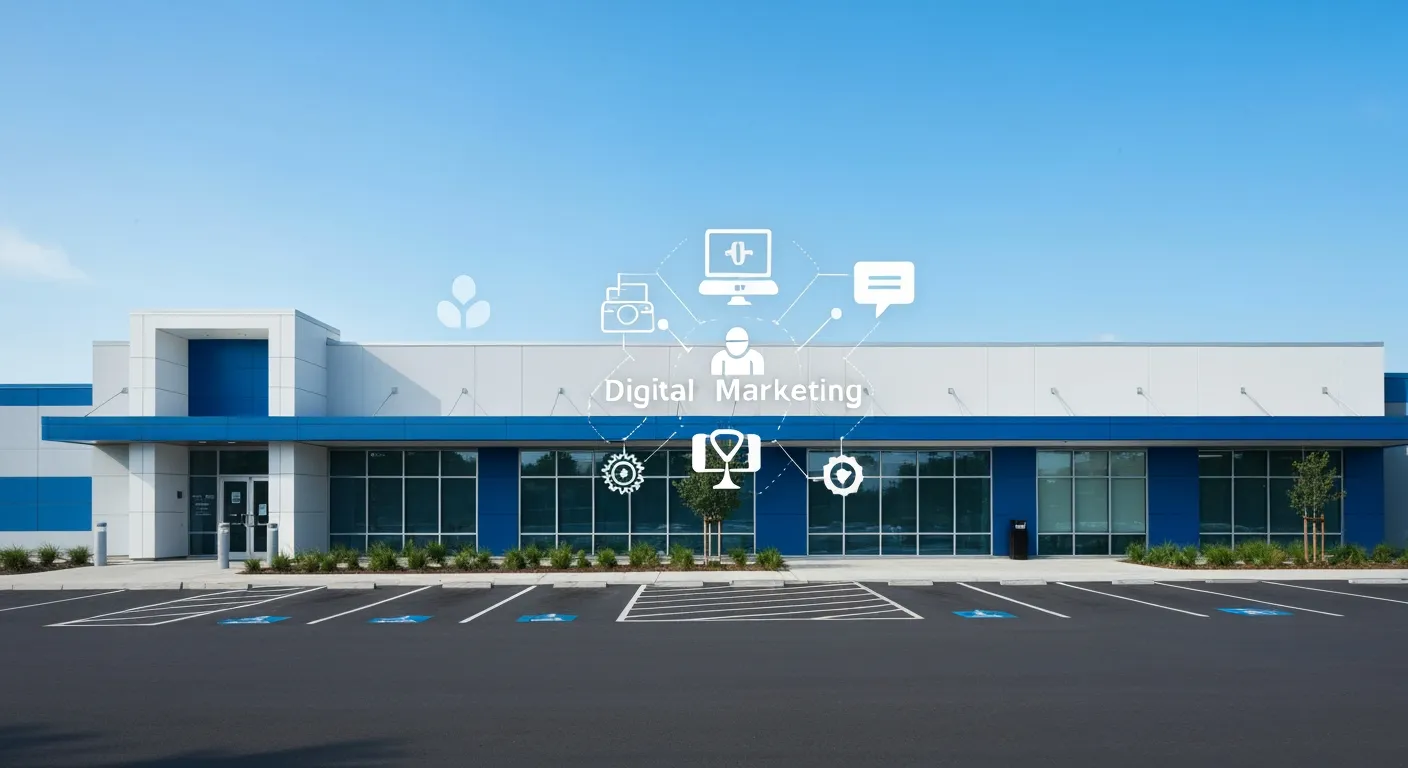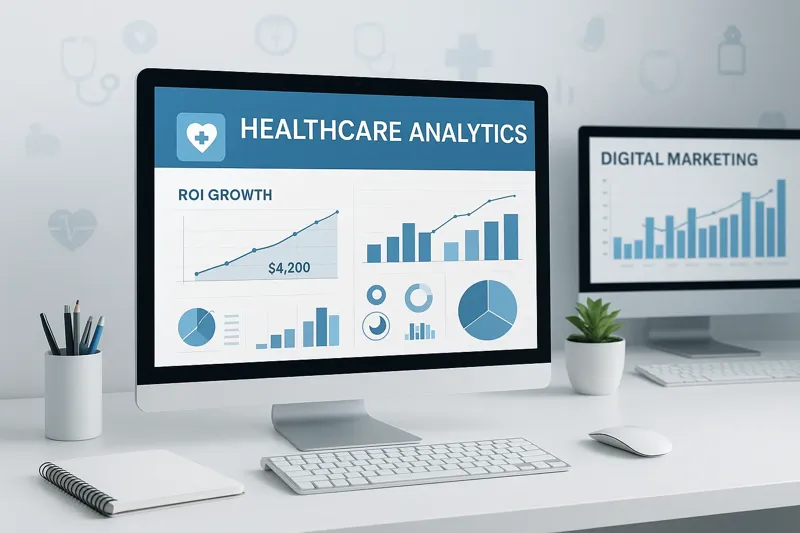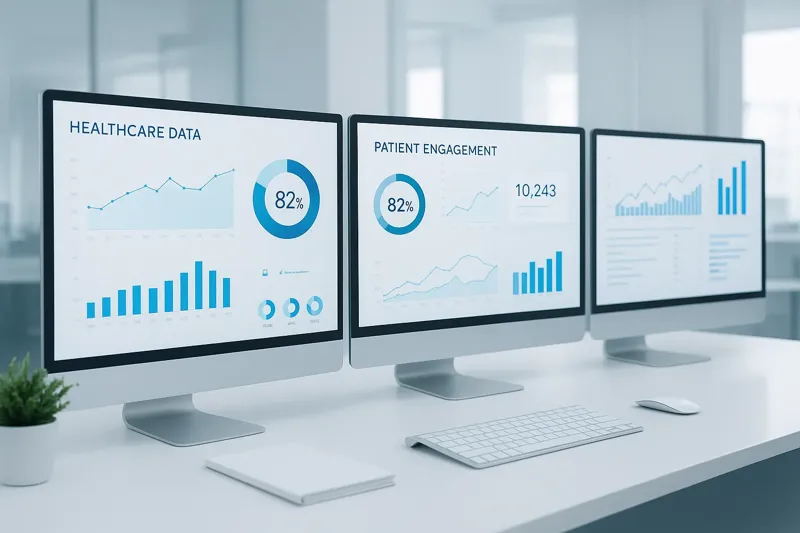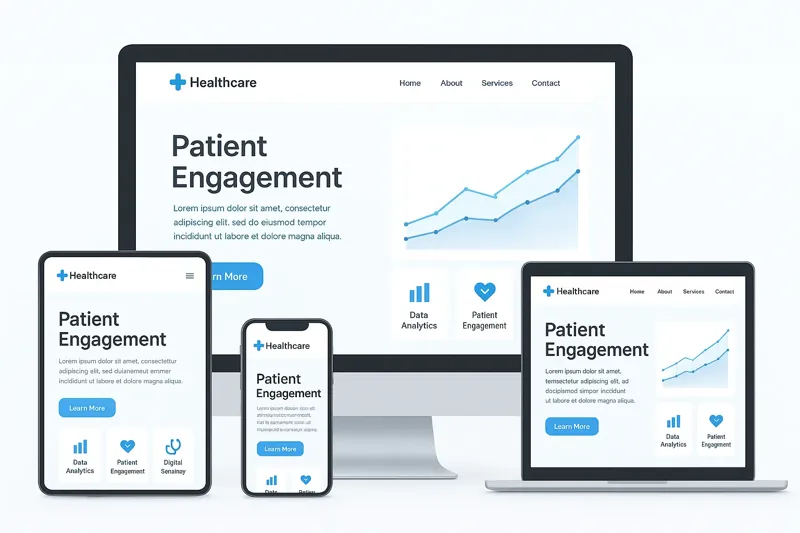Introduction to Google Ads and PPC for Healthcare Clinics
Overview of Google Ads in Healthcare
Google Ads is a vital digital marketing tool that enables healthcare clinics to reach patients actively searching for medical services. With over 5% of all Google searches being health-related, Google Ads presents clinics with immediate visibility in search results, helping attract high-intent patients. Google Ads campaigns use targeted keywords, location parameters, and demographic filters to connect clinics with their local communities effectively.
Importance of PPC for Clinics
Pay-Per-Click (PPC) advertising is particularly important for healthcare clinics because it offers measurable and cost-effective patient acquisition. Clinics pay only when a potential patient clicks an ad, ensuring budget efficiency. PPC empowers clinics to stand out in highly competitive healthcare markets and fill appointment calendars by targeting users who have demonstrated a clear intent to seek care.
Basics of PPC and Cost-Effectiveness
PPC operates on a bidding system where clinics bid for keywords relevant to their services, and advertising costs are incurred only when ads are clicked. This pay-for-performance model supports a high return on investment by focusing marketing budgets exclusively on engaged prospects. Combining PPC with optimized landing pages, clear calls-to-action, and compliance with healthcare advertising guidelines results in campaigns that not only drive traffic but also enhance patient trust and conversion rates.
Understanding the Unique Landscape of Healthcare PPC
What makes healthcare PPC unique compared to other sectors?
Healthcare Pay-Per-Click (PPC) advertising stands out due to its stringent regulatory environment and sensitive nature of the services promoted. Unlike many industries, healthcare PPC must comply rigorously with privacy laws such as HIPAA and adhere to Google’s specialized healthcare advertising policies. This includes prohibitions on using personal health information (PHI) in ads, strict certification requirements for certain services, and restrictions on remarketing practices as outlined in Google healthcare advertising policies.
Healthcare PPC Market Statistics
The healthcare sector actively utilizes PPC, with approximately 78% of healthcare marketers engaging in PPC campaigns. Over 5% of all Google searches are health-related, illustrating the sector’s massive online demand. Healthcare PPC offers high return on investment (ROI) due to targeting high-intent searches such as "urgent care near me," driving measurable patient acquisition and engagement through healthcare PPC campaign optimization.
Regulatory Environment Including HIPAA and Google Policies
Healthcare advertising must navigate strict guidelines to protect patient privacy and ensure ethical marketing. HIPAA compliance mandates that no protected health information be used for targeting or included in ads. Google further enforces advertising policies that restrict medication promotion, clinical trial recruitment, and patient-specific data usage. Certification processes like LegitScript are required for advertising certain healthcare services to ensure compliance with Google healthcare advertising restrictions.
Challenges Like Competition and Data Privacy
Healthcare PPC faces unique challenges including intense competition that drives up cost-per-click (CPC) rates. The high stakes require balancing creative, patient-centered messaging with strict compliance. Providers also manage audience skepticism about data privacy and must employ transparent, trustworthy campaigns to foster patient confidence. Furthermore, patient conversion journeys tend to be lengthy, demanding continuous engagement and optimized multi-channel healthcare PPC strategies.
By understanding these distinctive elements, healthcare marketers can tailor PPC strategies to maximize compliance, trust, and patient growth, ultimately delivering impactful and ethical digital marketing outcomes.
Structuring High-Performance Google Ads Campaigns for Clinics
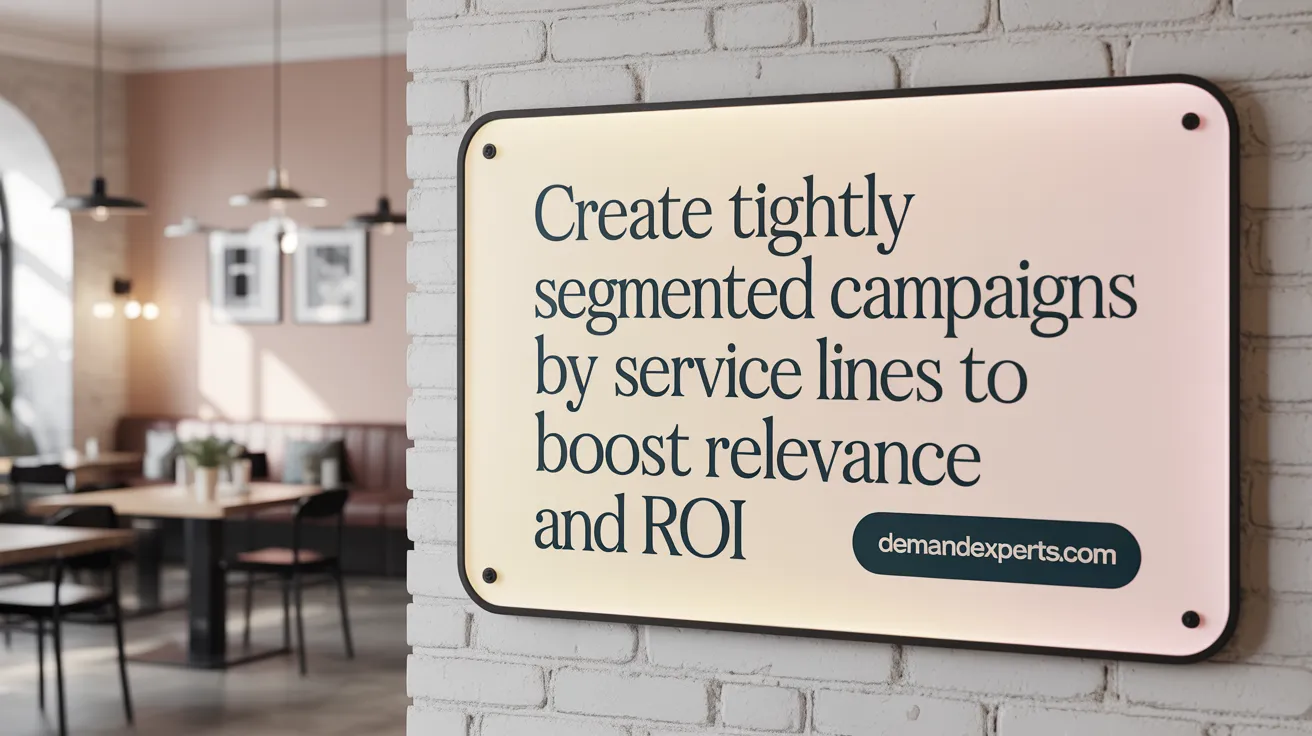
How should healthcare clinics structure their Google Ads campaigns?
Healthcare clinics achieve optimal results by segmenting their Google Ads campaigns according to specific service lines. This approach enhances ad relevance, elevates Google Quality Score in Healthcare PPC, and improves patient acquisition by targeting searchers with precise intent. For example, running separate campaigns for pediatric speech therapy and adult occupational therapy allows tailored messaging and keyword strategies that resonate with different patient needs (Healthcare PPC campaign structuring).
Campaign segmentation by service lines
Segmenting campaigns by service line enables clinics to create tightly themed ad groups that align with user search intent in healthcare ads. This increases ad relevance and lowers cost-per-click (CPC) by improving Google Quality Score in Healthcare PPC. Each service-specific campaign should have dedicated ad copy and landing pages designed to address the unique concerns of that patient segment, facilitating higher conversion rates (Healthcare landing page best practices.
Importance of local and geo-targeting
Local targeting is critical in healthcare PPC due to the predominantly local nature of healthcare services. Clinics should implement precise geo-targeting in healthcare ads that reflects actual patient travel patterns. Using location-specific keywords and ad copy, such as “Urgent Care in Rutland” or “Knee Surgery in Atlanta,” increases local relevancy and engagement. Layering demographic filters, like income level where permissible, further refines audience targeting (Location targeting in healthcare ads, Advanced Google Ads targeting).
Use of high-intent and long-tail keywords
Selecting high-intent healthcare keywords that clearly indicate patient needs is essential. Keywords incorporating specific treatments, conditions, and modifiers like “near me” or “covered by insurance” generally convert better and are more cost-effective. Long-tail keywords with moderate search volume reduce competition, enhance qualified lead generation, and improve ad efficiency.
Ad group and budget allocation strategies
Ad groups should be organized around closely related keywords and services to maintain message consistency. Budget allocation strategies must prioritize services and locations showing the highest return on investment (ROI). Rather than evenly distributing budgets across all campaigns, clinics should adopt flexible funding that can be scaled up in high-performing segments and dialed back in underperforming ones. Continual monitoring and testing allow responsive budget adjustments aligned with patient acquisition goals (Monitoring and testing Google Ads performance.
This structured campaign approach, combined with strategic keyword selection and precise geo-targeting, equips healthcare clinics with a high-performing Google Ads campaign framework for healthcare that maximizes patient engagement and cost-effective growth.
Crafting Compliant and Compelling Ad Copy
What are the best practices for healthcare PPC ad copy?
Effective healthcare PPC ad copy should be patient-centered, focusing on addressing patient pain points with clarity and reassurance. This involves crafting messages that are professional and empathetic without making exaggerated claims or guarantees, which are prohibited in healthcare advertising (Healthcare digital marketing regulations).
Ad copy must carefully avoid the inclusion of Protected Health Information (PHI) or any language that could violate HIPAA regulations. Advertisers should not use personal health data or imply patient-specific conditions, ensuring compliance with both legal and platform policies (Google healthcare advertising policies).
Clear calls-to-action (CTAs) are essential in guiding potential patients toward the next step, such as scheduling an appointment or contacting the clinic. Alongside CTAs, embedding trust signals—like certifications, patient ratings, or testimonials—builds credibility and confidence, which are critical for patient decision-making.
Moreover, the use of ad extensions significantly enhances ad performance. Implementing sitelinks allows users to navigate to specific services or information quickly. Call buttons facilitate immediate contact, and location extensions provide geographical context, helping to attract local patients effectively. These extensions increase the ad's relevance and improve click-through rates, contributing to overall campaign success.
By combining patient-focused, compliant messaging with strategic use of CTAs, trust signals, and ad extensions, healthcare PPC ads can effectively engage and convert prospective patients while maintaining regulatory compliance.
Optimizing Landing Pages for Maximum Conversion
How can healthcare clinics optimize landing pages for PPC campaigns?
Healthcare clinics can significantly boost PPC campaign performance by crafting landing pages that directly correspond to the ad content and relevant keywords. This alignment ensures prospective patients find exactly what they expect upon clicking, reducing bounce rates and enhancing conversion likelihood (Landing Page Optimization, Healthcare landing page best practices, Landing Page Optimization for Healthcare).
Mobile optimization is critical since a substantial portion of healthcare searches occur on smartphones. Fast load times coupled with responsive design improve user experience, keeping visitors engaged and encouraging action (Mobile Optimization for Healthcare, Fast-loading mobile healthcare landing pages, Responsive Design for Healthcare Sites).
Establishing trust is fundamental in healthcare marketing. Including authentic patient testimonials, detailed provider credentials, and certifications on landing pages reassures visitors of the clinic's expertise and reliability (Building trust healthcare PPC, Trust signals on healthcare landing pages, Professional Healthcare Websites).
Clear, visible calls-to-action (CTAs) guide users toward desired actions like booking an appointment or submitting an inquiry. Forms and data collection tools must comply with HIPAA regulations, ensuring patient information is securely handled, which further builds user confidence and transparency (Healthcare Google Ads call-to-action, HIPAA Compliance in Digital Marketing, Clear calls to action in healthcare ads).
By integrating these elements—targeted content alignment, mobile and speed optimization, trust signals, transparent and compliant CTAs—healthcare PPC landing pages become powerful conversion tools driving patient acquisition and engagement (Healthcare PPC Campaigns, Landing Page Optimization for Healthcare, Optimizing healthcare landing pages.
Advanced Targeting and Bidding Strategies in Healthcare PPC
What targeting and bidding strategies boost healthcare PPC effectiveness?
Healthcare PPC campaigns achieve higher efficiency through precise targeting and structured bidding approaches. Geo-targeting in Healthcare Ads concentrates ads within defined geographic areas, ensuring that healthcare providers reach patients in their service vicinity. This strategy is enhanced by integrating demographic filters such as age and gender, along with income-level targeting in Google Ads, which focuses on patients with higher purchasing power or specific insurance coverage. These combined filters refine audience reach, aligning ad spend with the most valuable local patient segments.
Bidding strategies typically begin with manual CPC in healthcare PPC, offering granular control over spend and keyword prioritization. Once sufficient data is acquired, campaigns transition to automated bidding models like Target Cost-Per-Acquisition (Target CPA) or Return on Ad Spend (Target ROAS), harnessing machine learning to maximize conversions and optimize budget allocation dynamically.
Another vital component is the use of negative keywords usage. By excluding irrelevant or low-intent search terms, healthcare advertisers prevent wasted clicks and reduce costs, ensuring ads appear only for prospective patients actively seeking relevant medical services. Simultaneously, optimizing the Google Quality Score in healthcare PPC by aligning ad copy, keywords, and landing page experience leads to improved ad rankings and lower costs per click.
Continuous improvement through A/B testing in Google Ads for doctors of ad headlines, copy, and bidding strategies is fundamental. This iterative testing allows marketers to identify high-performing messages and bid adjustments, improving click-through and conversion rates. Regular campaign monitoring and optimizing Google Ads supports data-driven decision-making, ensuring healthcare PPC investments deliver optimal patient acquisition outcomes.
Compliance and Regulatory Considerations in Healthcare PPC
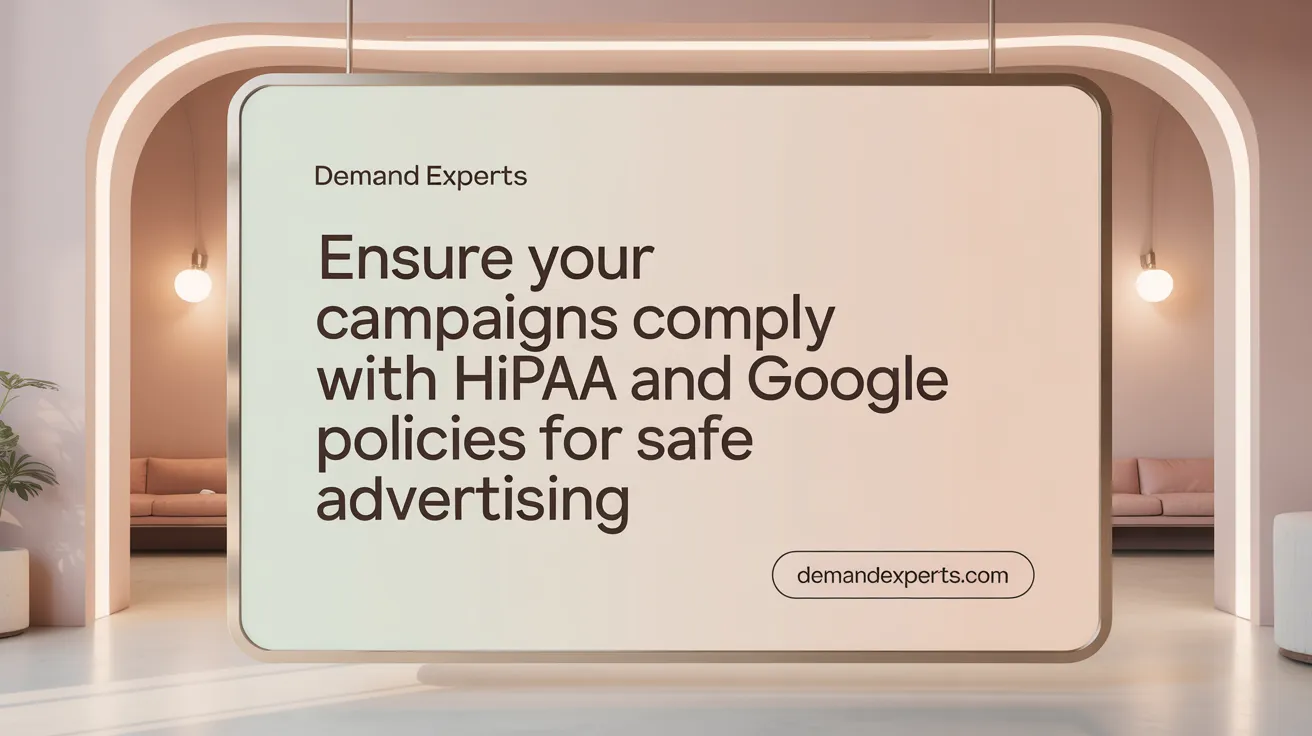
What compliance rules must healthcare clinics follow in Google Ads?
Healthcare clinics advertising on Google Ads must rigorously comply with HIPAA compliance in healthcare advertising by not including Protected Health Information (PHI) in their ad copy, URLs, or targeting parameters. Remarketing based on personalized health data or specific medical conditions is strictly prohibited to protect patient privacy. Additionally, Google enforces healthcare advertising policies that require certification—such as LegitScript certification—for promoting sensitive services like telemedicine and addiction treatment.
Ads must avoid promoting unapproved substances, experimental treatments, or making misleading or exaggerated claims that could violate FDA or Google guidelines. This includes restrictions on advertising clinical trial recruitment, restricted drug terms, and unapproved medical procedures (Healthcare digital marketing regulations.
Healthcare advertisers should handle sensitive topics with care, crafting messaging that is compliant, empathetic, and avoids stigma. Using trust signals and medically accurate descriptions while respecting privacy safeguards is essential.
Ensuring full compliance prevents ad disapprovals, suspension of advertising accounts, and potential legal consequences. Partnering with healthcare marketing experts specializing in regulatory adherence helps maintain campaign integrity and patient trust.
Careful monitoring of campaign content, adherence to evolving policies, and using HIPAA-compliant tools for conversion tracking underpin successful and compliant healthcare PPC campaigns.
Measuring and Tracking Conversions for ROI Optimization

How can healthcare clinics effectively track PPC conversions?
Healthcare clinics can optimize their PPC campaigns by meticulously tracking various conversion actions. Essential conversions to monitor include phone calls from ads, contact form submissions on landing pages, and direct appointment bookings. Each conversion channel represents a critical patient interaction point that contributes to business growth.
Integration of offline conversion data with online user behavior is vital. Clinics should employ CRM systems that sync with Google Analytics setup for healthcare PPC and call tracking in medical advertising technologies to capture data from both digital sources and offline appointment outcomes. This comprehensive tracking approach provides a full picture of patient acquisition pathways and enhances reporting accuracy.
Assigning specific monetary values to each conversion type empowers healthcare marketers to analyze ROI precisely. By quantifying the worth of calls, form leads, and booked appointments, clinics can optimize bidding strategies and budget allocation. This value-driven framework helps prioritize high-impact keywords and campaigns, ensuring maximum return on advertising spend.
Utilizing tools such as Google Analytics setup for healthcare PPC, call tracking in healthcare PPC, and integrated CRM systems facilitates precise conversion tracking and performance measurement, enabling ongoing optimization for improved patient acquisition and cost-efficiency.
Leveraging Remarketing and Multi-Channel Strategies

How can remarketing and multi-channel marketing enhance healthcare PPC?
Remarketing in healthcare PPC faces strict limitations due to privacy regulations like HIPAA compliance in healthcare advertising, which prohibit the use of personal health information (PHI) for targeted ads. However, compliant approaches using standard and dynamic remarketing based on anonymous user interactions allow healthcare providers to re-engage potential patients without violating privacy. This enables advertisers to deliver relevant ads to users who have previously shown interest but do not involve sensitive health data.
A multi-channel strategy that combines Google Ads with social platforms like Facebook Ads for healthcare storytelling offers a comprehensive patient acquisition funnel. Google Ads effectively capture high-intent search traffic from users actively seeking healthcare services, providing immediate appointment bookings and inquiries. Facebook Ads complement this by building brand awareness and patient trust through targeted storytelling and demographic targeting, nurturing patient relationships for longer-term engagement.
Integrating PPC with other digital marketing channels—such as Search Engine Optimization for Healthcare, Content Marketing in Healthcare, and reputation management—further amplifies campaign effectiveness. SEO improves organic visibility, attracting patients through optimized content and local search presence. Content marketing delivers trustworthy educational materials to empower patients, while reputation management leverages online reviews and testimonials to enhance credibility. Together, these channels create consistent messaging and trust-building that sustains patient acquisition beyond single-click conversions.
By carefully respecting privacy compliance and strategically combining remarketing with multi-channel digital marketing, healthcare providers can maximize return on their advertising investment while fostering long-term patient relationships.
Partnering With Healthcare PPC Experts for Optimal Results

Why should healthcare clinics work with PPC experts?
Healthcare PPC Advertising is uniquely challenging due to stringent regulations like HIPAA compliance in healthcare advertising, specialized audience targeting, and significant competition driving up costs. Collaborating with PPC experts who specialize in healthcare ensures campaigns comply with legal requirements while effectively reaching potential patients.
Benefits of specialized healthcare PPC agencies
Specialized agencies bring deep knowledge of healthcare advertising policies, enabling compliant ad creation that avoids pitfalls such as use of Protected Health Information (PHI). They apply data-driven healthcare PPC strategies, leveraging advanced keyword research, ad copywriting, and geo-targeting tailored to specific service lines and locations.
Handling regulatory complexity and optimization
Healthcare PPC experts navigate Google’s strict healthcare policies, certification processes, and platform restrictions to secure ad approvals. They continuously monitor campaigns, perform regular healthcare PPC audits, and refine bidding, keyword selection, and targeting to maximize Google Quality Score in healthcare PPC and ROI.
Data-driven and compliant campaign strategies
Agencies utilize robust analytics and healthcare PPC conversion attribution modeling to measure performance of calls, appointment bookings, and form submissions. Integration with CRM systems facilitates attribution modeling, ensuring the highest-value leads are prioritized. Compliance with privacy standards is maintained via HIPAA-compliant tools and avoiding remarketing with sensitive health data.
Examples of agency services including audits and reporting
Leading healthcare PPC agencies, such as Silverback Strategies, offer comprehensive services: paid search, paid social, display advertising, landing page optimization, and Google Analytics setup for healthcare PPC. They provide transparent, HIPAA-compliant reporting and actionable insights, enabling healthcare providers to confidently invest in and grow patient acquisition through optimized, legally compliant PPC campaigns.
Conclusion: Driving Growth Through Smart Google Ads and PPC Practices
Strategic Approaches to Healthcare PPC Success
Implementing a well-structured healthcare PPC campaign begins with refined keyword strategy, precise geo-targeting, and patient-centric ad copy. Prioritizing long-tail, high-intent keywords aligned with localized search behavior enhances lead quality and relevance. Robust conversion tracking mechanisms, including calls, appointment bookings, and form submissions, provide measurable insights critical for campaign refinement.
Continuous Optimization and Compliance
Healthcare PPC campaigns demand regular monitoring and data-driven adjustments. Testing ad variations, updating bids, and refining keywords maintain high Quality Scores and maximize return on ad spend. Compliance with HIPAA and Google's stringent healthcare advertising policies safeguards against costly disapprovals and promotes trust with patients. Adherence to these regulations must be integrated throughout campaign management, especially avoiding the use of protected health information in ads and tracking.
Leveraging Expert Partnerships for Sustainable Growth
Navigating the complex healthcare PPC landscape can be challenging without dedicated expertise. Partnering with specialized agencies that understand healthcare compliance, competitive dynamics, and patient acquisition strategies ensures optimized campaign performance. These expert partnerships provide strategic guidance, advanced analytical support, and scalable solutions that drive both immediate patient engagement and long-term practice growth.
Investing in smart Google Ads and PPC practices tailored to healthcare creates a powerful avenue for practices to enhance visibility, build patient trust, and achieve sustainable growth. Continuous optimization combined with regulatory adherence and expert collaboration positions healthcare providers to thrive in an increasingly competitive digital environment.
Introduction to Google Ads and PPC for Healthcare Clinics
Overview of Google Ads in Healthcare
Google Ads is a vital digital marketing tool that enables healthcare clinics to reach patients actively searching for medical services. With over 5% of all Google searches being health-related, Google Ads presents clinics with immediate visibility in search results, helping attract high-intent patients. Google Ads campaigns use targeted keywords, location parameters, and demographic filters to connect clinics with their local communities effectively.
Importance of PPC for Clinics
Pay-Per-Click (PPC) advertising is particularly important for healthcare clinics because it offers measurable and cost-effective patient acquisition. Clinics pay only when a potential patient clicks an ad, ensuring budget efficiency. PPC empowers clinics to stand out in highly competitive healthcare markets and fill appointment calendars by targeting users who have demonstrated a clear intent to seek care.
Basics of PPC and Cost-Effectiveness
PPC operates on a bidding system where clinics bid for keywords relevant to their services, and advertising costs are incurred only when ads are clicked. This pay-for-performance model supports a high return on investment by focusing marketing budgets exclusively on engaged prospects. Combining PPC with optimized landing pages, clear calls-to-action, and compliance with healthcare advertising guidelines results in campaigns that not only drive traffic but also enhance patient trust and conversion rates.
Understanding the Unique Landscape of Healthcare PPC
What makes healthcare PPC unique compared to other sectors?
Healthcare Pay-Per-Click (PPC) advertising stands out due to its stringent regulatory environment and sensitive nature of the services promoted. Unlike many industries, healthcare PPC must comply rigorously with privacy laws such as HIPAA and adhere to Google’s specialized healthcare advertising policies. This includes prohibitions on using personal health information (PHI) in ads, strict certification requirements for certain services, and restrictions on remarketing practices as outlined in Google healthcare advertising policies.
Healthcare PPC Market Statistics
The healthcare sector actively utilizes PPC, with approximately 78% of healthcare marketers engaging in PPC campaigns. Over 5% of all Google searches are health-related, illustrating the sector’s massive online demand. Healthcare PPC offers high return on investment (ROI) due to targeting high-intent searches such as "urgent care near me," driving measurable patient acquisition and engagement through healthcare PPC campaign optimization.
Regulatory Environment Including HIPAA and Google Policies
Healthcare advertising must navigate strict guidelines to protect patient privacy and ensure ethical marketing. HIPAA compliance mandates that no protected health information be used for targeting or included in ads. Google further enforces advertising policies that restrict medication promotion, clinical trial recruitment, and patient-specific data usage. Certification processes like LegitScript are required for advertising certain healthcare services to ensure compliance with Google healthcare advertising restrictions.
Challenges Like Competition and Data Privacy
Healthcare PPC faces unique challenges including intense competition that drives up cost-per-click (CPC) rates. The high stakes require balancing creative, patient-centered messaging with strict compliance. Providers also manage audience skepticism about data privacy and must employ transparent, trustworthy campaigns to foster patient confidence. Furthermore, patient conversion journeys tend to be lengthy, demanding continuous engagement and optimized multi-channel healthcare PPC strategies.
By understanding these distinctive elements, healthcare marketers can tailor PPC strategies to maximize compliance, trust, and patient growth, ultimately delivering impactful and ethical digital marketing outcomes.
Structuring High-Performance Google Ads Campaigns for Clinics

How should healthcare clinics structure their Google Ads campaigns?
Healthcare clinics achieve optimal results by segmenting their Google Ads campaigns according to specific service lines. This approach enhances ad relevance, elevates Google Quality Score in Healthcare PPC, and improves patient acquisition by targeting searchers with precise intent. For example, running separate campaigns for pediatric speech therapy and adult occupational therapy allows tailored messaging and keyword strategies that resonate with different patient needs (Healthcare PPC campaign structuring).
Campaign segmentation by service lines
Segmenting campaigns by service line enables clinics to create tightly themed ad groups that align with user search intent in healthcare ads. This increases ad relevance and lowers cost-per-click (CPC) by improving Google Quality Score in Healthcare PPC. Each service-specific campaign should have dedicated ad copy and landing pages designed to address the unique concerns of that patient segment, facilitating higher conversion rates (Healthcare landing page best practices.
Importance of local and geo-targeting
Local targeting is critical in healthcare PPC due to the predominantly local nature of healthcare services. Clinics should implement precise geo-targeting in healthcare ads that reflects actual patient travel patterns. Using location-specific keywords and ad copy, such as “Urgent Care in Rutland” or “Knee Surgery in Atlanta,” increases local relevancy and engagement. Layering demographic filters, like income level where permissible, further refines audience targeting (Location targeting in healthcare ads, Advanced Google Ads targeting).
Use of high-intent and long-tail keywords
Selecting high-intent healthcare keywords that clearly indicate patient needs is essential. Keywords incorporating specific treatments, conditions, and modifiers like “near me” or “covered by insurance” generally convert better and are more cost-effective. Long-tail keywords with moderate search volume reduce competition, enhance qualified lead generation, and improve ad efficiency.
Ad group and budget allocation strategies
Ad groups should be organized around closely related keywords and services to maintain message consistency. Budget allocation strategies must prioritize services and locations showing the highest return on investment (ROI). Rather than evenly distributing budgets across all campaigns, clinics should adopt flexible funding that can be scaled up in high-performing segments and dialed back in underperforming ones. Continual monitoring and testing allow responsive budget adjustments aligned with patient acquisition goals (Monitoring and testing Google Ads performance.
This structured campaign approach, combined with strategic keyword selection and precise geo-targeting, equips healthcare clinics with a high-performing Google Ads campaign framework for healthcare that maximizes patient engagement and cost-effective growth.
Crafting Compliant and Compelling Ad Copy
What are the best practices for healthcare PPC ad copy?
Effective healthcare PPC ad copy should be patient-centered, focusing on addressing patient pain points with clarity and reassurance. This involves crafting messages that are professional and empathetic without making exaggerated claims or guarantees, which are prohibited in healthcare advertising (Healthcare digital marketing regulations).
Ad copy must carefully avoid the inclusion of Protected Health Information (PHI) or any language that could violate HIPAA regulations. Advertisers should not use personal health data or imply patient-specific conditions, ensuring compliance with both legal and platform policies (Google healthcare advertising policies).
Clear calls-to-action (CTAs) are essential in guiding potential patients toward the next step, such as scheduling an appointment or contacting the clinic. Alongside CTAs, embedding trust signals—like certifications, patient ratings, or testimonials—builds credibility and confidence, which are critical for patient decision-making.
Moreover, the use of ad extensions significantly enhances ad performance. Implementing sitelinks allows users to navigate to specific services or information quickly. Call buttons facilitate immediate contact, and location extensions provide geographical context, helping to attract local patients effectively. These extensions increase the ad's relevance and improve click-through rates, contributing to overall campaign success.
By combining patient-focused, compliant messaging with strategic use of CTAs, trust signals, and ad extensions, healthcare PPC ads can effectively engage and convert prospective patients while maintaining regulatory compliance.
Optimizing Landing Pages for Maximum Conversion
How can healthcare clinics optimize landing pages for PPC campaigns?
Healthcare clinics can significantly boost PPC campaign performance by crafting landing pages that directly correspond to the ad content and relevant keywords. This alignment ensures prospective patients find exactly what they expect upon clicking, reducing bounce rates and enhancing conversion likelihood (Landing Page Optimization, Healthcare landing page best practices, Landing Page Optimization for Healthcare).
Mobile optimization is critical since a substantial portion of healthcare searches occur on smartphones. Fast load times coupled with responsive design improve user experience, keeping visitors engaged and encouraging action (Mobile Optimization for Healthcare, Fast-loading mobile healthcare landing pages, Responsive Design for Healthcare Sites).
Establishing trust is fundamental in healthcare marketing. Including authentic patient testimonials, detailed provider credentials, and certifications on landing pages reassures visitors of the clinic's expertise and reliability (Building trust healthcare PPC, Trust signals on healthcare landing pages, Professional Healthcare Websites).
Clear, visible calls-to-action (CTAs) guide users toward desired actions like booking an appointment or submitting an inquiry. Forms and data collection tools must comply with HIPAA regulations, ensuring patient information is securely handled, which further builds user confidence and transparency (Healthcare Google Ads call-to-action, HIPAA Compliance in Digital Marketing, Clear calls to action in healthcare ads).
By integrating these elements—targeted content alignment, mobile and speed optimization, trust signals, transparent and compliant CTAs—healthcare PPC landing pages become powerful conversion tools driving patient acquisition and engagement (Healthcare PPC Campaigns, Landing Page Optimization for Healthcare, Optimizing healthcare landing pages.
Advanced Targeting and Bidding Strategies in Healthcare PPC
What targeting and bidding strategies boost healthcare PPC effectiveness?
Healthcare PPC campaigns achieve higher efficiency through precise targeting and structured bidding approaches. Geo-targeting in Healthcare Ads concentrates ads within defined geographic areas, ensuring that healthcare providers reach patients in their service vicinity. This strategy is enhanced by integrating demographic filters such as age and gender, along with income-level targeting in Google Ads, which focuses on patients with higher purchasing power or specific insurance coverage. These combined filters refine audience reach, aligning ad spend with the most valuable local patient segments.
Bidding strategies typically begin with manual CPC in healthcare PPC, offering granular control over spend and keyword prioritization. Once sufficient data is acquired, campaigns transition to automated bidding models like Target Cost-Per-Acquisition (Target CPA) or Return on Ad Spend (Target ROAS), harnessing machine learning to maximize conversions and optimize budget allocation dynamically.
Another vital component is the use of negative keywords usage. By excluding irrelevant or low-intent search terms, healthcare advertisers prevent wasted clicks and reduce costs, ensuring ads appear only for prospective patients actively seeking relevant medical services. Simultaneously, optimizing the Google Quality Score in healthcare PPC by aligning ad copy, keywords, and landing page experience leads to improved ad rankings and lower costs per click.
Continuous improvement through A/B testing in Google Ads for doctors of ad headlines, copy, and bidding strategies is fundamental. This iterative testing allows marketers to identify high-performing messages and bid adjustments, improving click-through and conversion rates. Regular campaign monitoring and optimizing Google Ads supports data-driven decision-making, ensuring healthcare PPC investments deliver optimal patient acquisition outcomes.
Compliance and Regulatory Considerations in Healthcare PPC

What compliance rules must healthcare clinics follow in Google Ads?
Healthcare clinics advertising on Google Ads must rigorously comply with HIPAA compliance in healthcare advertising by not including Protected Health Information (PHI) in their ad copy, URLs, or targeting parameters. Remarketing based on personalized health data or specific medical conditions is strictly prohibited to protect patient privacy. Additionally, Google enforces healthcare advertising policies that require certification—such as LegitScript certification—for promoting sensitive services like telemedicine and addiction treatment.
Ads must avoid promoting unapproved substances, experimental treatments, or making misleading or exaggerated claims that could violate FDA or Google guidelines. This includes restrictions on advertising clinical trial recruitment, restricted drug terms, and unapproved medical procedures (Healthcare digital marketing regulations.
Healthcare advertisers should handle sensitive topics with care, crafting messaging that is compliant, empathetic, and avoids stigma. Using trust signals and medically accurate descriptions while respecting privacy safeguards is essential.
Ensuring full compliance prevents ad disapprovals, suspension of advertising accounts, and potential legal consequences. Partnering with healthcare marketing experts specializing in regulatory adherence helps maintain campaign integrity and patient trust.
Careful monitoring of campaign content, adherence to evolving policies, and using HIPAA-compliant tools for conversion tracking underpin successful and compliant healthcare PPC campaigns.
Measuring and Tracking Conversions for ROI Optimization

How can healthcare clinics effectively track PPC conversions?
Healthcare clinics can optimize their PPC campaigns by meticulously tracking various conversion actions. Essential conversions to monitor include phone calls from ads, contact form submissions on landing pages, and direct appointment bookings. Each conversion channel represents a critical patient interaction point that contributes to business growth.
Integration of offline conversion data with online user behavior is vital. Clinics should employ CRM systems that sync with Google Analytics setup for healthcare PPC and call tracking in medical advertising technologies to capture data from both digital sources and offline appointment outcomes. This comprehensive tracking approach provides a full picture of patient acquisition pathways and enhances reporting accuracy.
Assigning specific monetary values to each conversion type empowers healthcare marketers to analyze ROI precisely. By quantifying the worth of calls, form leads, and booked appointments, clinics can optimize bidding strategies and budget allocation. This value-driven framework helps prioritize high-impact keywords and campaigns, ensuring maximum return on advertising spend.
Utilizing tools such as Google Analytics setup for healthcare PPC, call tracking in healthcare PPC, and integrated CRM systems facilitates precise conversion tracking and performance measurement, enabling ongoing optimization for improved patient acquisition and cost-efficiency.
Leveraging Remarketing and Multi-Channel Strategies

How can remarketing and multi-channel marketing enhance healthcare PPC?
Remarketing in healthcare PPC faces strict limitations due to privacy regulations like HIPAA compliance in healthcare advertising, which prohibit the use of personal health information (PHI) for targeted ads. However, compliant approaches using standard and dynamic remarketing based on anonymous user interactions allow healthcare providers to re-engage potential patients without violating privacy. This enables advertisers to deliver relevant ads to users who have previously shown interest but do not involve sensitive health data.
A multi-channel strategy that combines Google Ads with social platforms like Facebook Ads for healthcare storytelling offers a comprehensive patient acquisition funnel. Google Ads effectively capture high-intent search traffic from users actively seeking healthcare services, providing immediate appointment bookings and inquiries. Facebook Ads complement this by building brand awareness and patient trust through targeted storytelling and demographic targeting, nurturing patient relationships for longer-term engagement.
Integrating PPC with other digital marketing channels—such as Search Engine Optimization for Healthcare, Content Marketing in Healthcare, and reputation management—further amplifies campaign effectiveness. SEO improves organic visibility, attracting patients through optimized content and local search presence. Content marketing delivers trustworthy educational materials to empower patients, while reputation management leverages online reviews and testimonials to enhance credibility. Together, these channels create consistent messaging and trust-building that sustains patient acquisition beyond single-click conversions.
By carefully respecting privacy compliance and strategically combining remarketing with multi-channel digital marketing, healthcare providers can maximize return on their advertising investment while fostering long-term patient relationships.
Partnering With Healthcare PPC Experts for Optimal Results

Why should healthcare clinics work with PPC experts?
Healthcare PPC Advertising is uniquely challenging due to stringent regulations like HIPAA compliance in healthcare advertising, specialized audience targeting, and significant competition driving up costs. Collaborating with PPC experts who specialize in healthcare ensures campaigns comply with legal requirements while effectively reaching potential patients.
Benefits of specialized healthcare PPC agencies
Specialized agencies bring deep knowledge of healthcare advertising policies, enabling compliant ad creation that avoids pitfalls such as use of Protected Health Information (PHI). They apply data-driven healthcare PPC strategies, leveraging advanced keyword research, ad copywriting, and geo-targeting tailored to specific service lines and locations.
Handling regulatory complexity and optimization
Healthcare PPC experts navigate Google’s strict healthcare policies, certification processes, and platform restrictions to secure ad approvals. They continuously monitor campaigns, perform regular healthcare PPC audits, and refine bidding, keyword selection, and targeting to maximize Google Quality Score in healthcare PPC and ROI.
Data-driven and compliant campaign strategies
Agencies utilize robust analytics and healthcare PPC conversion attribution modeling to measure performance of calls, appointment bookings, and form submissions. Integration with CRM systems facilitates attribution modeling, ensuring the highest-value leads are prioritized. Compliance with privacy standards is maintained via HIPAA-compliant tools and avoiding remarketing with sensitive health data.
Examples of agency services including audits and reporting
Leading healthcare PPC agencies, such as Silverback Strategies, offer comprehensive services: paid search, paid social, display advertising, landing page optimization, and Google Analytics setup for healthcare PPC. They provide transparent, HIPAA-compliant reporting and actionable insights, enabling healthcare providers to confidently invest in and grow patient acquisition through optimized, legally compliant PPC campaigns.
Conclusion: Driving Growth Through Smart Google Ads and PPC Practices
Strategic Approaches to Healthcare PPC Success
Implementing a well-structured healthcare PPC campaign begins with refined keyword strategy, precise geo-targeting, and patient-centric ad copy. Prioritizing long-tail, high-intent keywords aligned with localized search behavior enhances lead quality and relevance. Robust conversion tracking mechanisms, including calls, appointment bookings, and form submissions, provide measurable insights critical for campaign refinement.
Continuous Optimization and Compliance
Healthcare PPC campaigns demand regular monitoring and data-driven adjustments. Testing ad variations, updating bids, and refining keywords maintain high Quality Scores and maximize return on ad spend. Compliance with HIPAA and Google's stringent healthcare advertising policies safeguards against costly disapprovals and promotes trust with patients. Adherence to these regulations must be integrated throughout campaign management, especially avoiding the use of protected health information in ads and tracking.
Leveraging Expert Partnerships for Sustainable Growth
Navigating the complex healthcare PPC landscape can be challenging without dedicated expertise. Partnering with specialized agencies that understand healthcare compliance, competitive dynamics, and patient acquisition strategies ensures optimized campaign performance. These expert partnerships provide strategic guidance, advanced analytical support, and scalable solutions that drive both immediate patient engagement and long-term practice growth.
Investing in smart Google Ads and PPC practices tailored to healthcare creates a powerful avenue for practices to enhance visibility, build patient trust, and achieve sustainable growth. Continuous optimization combined with regulatory adherence and expert collaboration positions healthcare providers to thrive in an increasingly competitive digital environment.


